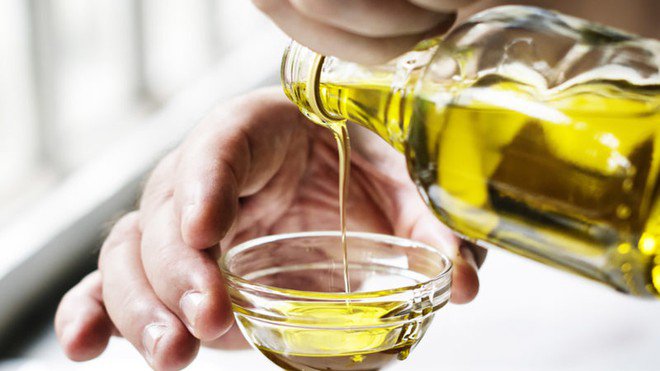Olive oil has beneficial properties for health, as it is obtained through a mechanical process rather than chemical refinement. Therefore, it preserves medicinal values, as well as components that treat and prevent diseases. The following information will provide a complete overview of the uses and harms of olive oil.
1. Uses of Olive Oil
Olive oil has long been proven to be beneficial food for human health, especially extra virgin olive oil, which is extracted entirely through manual processes, thus retaining all beneficial health components.
Olive oil is rich in Omega 3 and Omega 6 (components similar to those found in breast milk), antioxidants, anti-inflammatory agents, allergens, and antiviral properties that are beneficial for various organs and systems in the body, specifically:
- Cardiovascular System: Olive oil helps reduce “bad” cholesterol (LDL) and maintains “good” cholesterol (HDL) levels in the blood, preventing the formation of cholesterol plaques in the vessels. Many studies have shown that olive oil can protect the body against cardiovascular diseases such as valvular heart disease, congenital heart disease, arrhythmias, atherosclerosis, aortic aneurysms, etc. The mortality rate from cardiovascular diseases in areas where olive oil is the main source of fat in daily meals is lower than in other areas.
- Stroke: People who regularly use olive oil have a 41% lower risk of stroke compared to others.
- Cancer: One of the important components of olive oil is called phenolic. This component has the ability to inhibit the appearance of cancer cells through various means.
- Reducing inflammation in the body
- Has the ability to combat oxidation, limiting damage to different types of cells
- Eliminates cancer cells
- Many studies have shown that using olive oil daily has a positive effect in cancer prevention.
- Obesity: Olive oil not only does not cause obesity but also has the ability to reduce the amount of stored fat in the body, especially abdominal fat. A low-calorie diet rich in pure olive oil makes obese individuals feel full more quickly, thereby reducing the intake of carbohydrates.
- Digestive system: Olive oil contributes to improving digestive function, promotes a stronger metabolic process, prevents gallstones, and protects the stomach. Additionally, olive oil also has a laxative effect.
- Role in the development of the body: Positively impacts the formation and development of the skeleton.
- Reducing the aging process: The components in olive oil help neutralize free radicals in the body, aiding in slowing down the aging process, repairing damaged tissues, and preventing Alzheimer’s disease in the elderly.
- Infection: People in the Mediterranean region often use olive leaves to treat infections. The extract of olive leaves has the ability to inhibit the growth of bacteria, fungi, and viruses. However, this effect of olive is not emphasized compared to its other health benefits.
- Olive oil for skin: Moisturizes the skin. Olive oil contains vitamin E, which helps improve skin health by treating inflammation, acne, and dry skin. It also improves skin elasticity and regenerative properties. Antioxidants, minerals, and healthy fats combat free radicals and contribute to healthier skin.
- Olive oil for hair: Olive oil has the effect of treating dandruff. Olive oil moisturizes the hair and reduces scalp irritation, further decreasing dandruff. Simply heat a cup of olive oil and generously massage it into the hair, especially on the scalp and tips. Let it sit for 20 minutes, then rinse the hair with a mild shampoo. In addition, olive oil also moisturizes the hair and promotes hair growth. The smoothing and quality-enhancing properties of olive oil have quickly become recognized worldwide. Bring your lifeless locks back to life with a moisturizing oil treatment of olive oil (1/2 teaspoon), honey (2 tablespoons), and a protein-rich egg yolk. Mix the ingredients thoroughly to obtain a smooth mixture. Apply the paste to your hair and let it sit for 20 minutes, then rinse with cold water. Following this routine twice a week will show results. Olive oil is very rich in Vitamin E, which helps strengthen hair and prevent hair loss. Regular massage with olive oil can also remedy split ends.

In addition to the unsaturated fatty acids considered beneficial for the body, olive oil also contains a sufficient amount of vitamins such as D, E, and K.
Olive oil has the ability to prevent type 2 diabetes through its mechanism of reducing blood sugar levels and increasing insulin sensitivity. A diet with olive oil in the Mediterranean has helped them reduce the risk of developing type 2 diabetes by more than 40%.
In addition, olive oil may assist in the treatment of rheumatoid arthritis – an autoimmune disease characterized by deformed joints that cause pain for patients. Especially when combined with another food rich in omega-3, fish oil, they have the potential to improve morning stiffness or pain in individuals with rheumatoid arthritis.
The antibacterial properties of the components in olive oil help inhibit or kill harmful bacteria, typically Helicobacter – a type of bacteria that lives in the stomach causing ulcers and stomach cancer. Consuming 30 grams of pure olive oil daily can help reduce the amount of Helicobacter bacteria by 10% to 40% in just two weeks.

2. Harmful effects of using olive oil
- Allergies or hypersensitivity to olive oil.
- Caution should be exercised when used together with antibiotics.
- The use of olive oil should be limited during pregnancy or breastfeeding, as no studies have proven that it is completely harmless.
- Olive oil has the potential to lower blood sugar levels, which can lead to hypoglycemia in some cases.
- Discuss with your doctor about all the foods being consumed to identify any potential adverse interactions.
- Olive oil tends to have a subtle greenish-yellow color with a light peppery flavor; it also has a beautiful fragrant and pungent aroma. This is a high-quality extra virgin oil, so to gain all the benefits of olive oil in food preparation, it should not be used at very high temperatures, thus it is not recommended for frying.
- It is better to use extra virgin olive oil for raw or cold cooking. Olive oil can be used in salads, as a dressing, for bread, and for dipping. Light sautéing can also be done using extra virgin olive oil.

